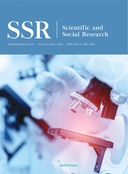Abstract
Under the current pattern of poverty alleviation and development, enterprises are regarded as an important subject for precise poverty alleviation and development, further the state has successively issued a series of documents to encourage and strengthen the enterprises’ participation in poverty alleviation and development. By selecting relevant financial data of private listed companies in Shanghai and Shenzhen A-shares in China from 2016 to 2019, the study finds that corporate violations and participation in the precise poverty alleviation are significant and positively related. Further, this paper explores on the motives of private listed companies in precise poverty alleviation behaviors, and discuss the intrinsic link between irregularities and their behaviors, to enhance and deepen the understanding about precise poverty alleviation behaviors of the private listed companies.
References
Chen CJ, Patten DM, Roberts RW, 2008, Corporate Charitable Contributions: A Corporate Social Performance or Legitimacy Strategy? Journal of Business Ethics, 82(1): 131-144.
Gao LF, Chen ZQ, 2020, The Nature of Property Rights, Corporate Violations and Precise Poverty Alleviation. Journal of Qiqihar University (Philosophy and Social Science Edition), 2020(09): 70-76.
Chen D, 2019, The Impact of A-Share Market Enterprises’ Participation in Poverty Alleviation on Financing Constraints. Market Research, 2019(01): 19-21.
Sun J, Sun Y, 2022, Internal Capital Market, Pyramid Hierarchy and Cash Holdings-Empirical Evidence Based on Private Listed Companies. Friends of Accounting, 2022(08): 15-22.
Xu N, Wang J, Niu X, et al., 2021, Executive Internal Pay Gap, Entrepreneurship and Inefficient Investment: Based on Empirical Data of Private Listed Companies. Finance and Accounting Newsletter, 2021(22): 32-36.
Wang M, Chen Z, Ma Y, 2021, The Foreign Residency of Beneficial Owners and Corporate Risk-Taking: Empirical Evidence from A-Share Listed Private Companies. Finance and Economics Series, 2021(09): 71-81.
Chen J, Liu Y, 2021, Controlling Shareholder Equity Pledges, Outside Investors and R&D Investment: Empirical Evidence Based on A-Share Private Listed Companies. Friends of Accounting, 2021(21): 59-67.
Xiang J, Quan Y, 2021, Tethered Firms and Analysts’ Forecast Accuracy-Empirical Evidence from Private Listed Companies in China. Contemporary Finance and Economics, 2021(09): 137-148.
Wang LG, Zhao L, 2021, The Combination of Production and Financing and Investment Efficiency of Private Enterprises: An Empirical Study Based on A-Share Listed Companies. Macroeconomic Research, 2021(07): 38-53.
Lu J, 2015, Do Female Executives Inhibit Listed Companies from Violating the Rules? Empirical Evidence from the Chinese Capital Market. China Economic Issues, 2015(05): 66-81.
Wang Q, Tian ZH, 2013, Endogeneity Test of Agricultural Tariff Policy: An Analysis Based on International Data. World Economic Research, 2013(03): 48-52+79+88.
Zhong Y, Liu R, 2007, Endogeneity Test of China’s Agricultural Imports and Tariffs. Agricultural Technology Economics, 2007(05): 105-109.
Wang X, Hu S, 2022, Does School-Enterprise Cooperation Enhance the Technological Innovation Performance of Manufacturing Firms? An Empirical Study Based on Propensity Score Matching Method. Technology Economics, 41(04): 30-43.
Zhan X, Mei Z, Bai Y, 2022, The Impact of Xingbian Fumin Action on Educational Human Capital in China’s Frontier Regions: An Empirical Analysis Based on Propensity Score Matching Method. Guizhou Ethnic Studies, 43(01): 168-175.
Zhao Y, Hou H, Miao X, 2022, Government Environmental Subsidies, Institutional Incentives and Corporate Green Innovation-An Empirical Analysis Based on Propensity Score Matching Method. Local Finance Research, 2022(01): 49-62.
Lian F, 2021, Research on Early Warning of Financial Crisis in Emerging Market Countries: An Empirical Test Based on Logit Model. Technology Economics and Management Research, 2021(07): 67-71.
Jiang S, Zhu W, 2021, A Study on the Characteristics of Agricultural Insurance Purchase Preferences of New Agricultural Management Subjects Based on Logit Model. Financial Theory and Practice, 42(02): 50-56.
Liu M, Qiao GM, Cheng R, 2020, Research on Early Warning of Sovereign Debt Crisis in Emerging Economies Based on Logit Model. International Financial Studies, 2020(03): 55-64.
Li B, Liu Y, 2015, Balance Test of National Economic Accounting Data. Statistical Research, 32(06): 11-19.
Fan C, 2017, An Empirical Test of the Relationship between Economic Growth Rate and CPI in China. Statistics and Decision Making, 2017(02): 126-129.
